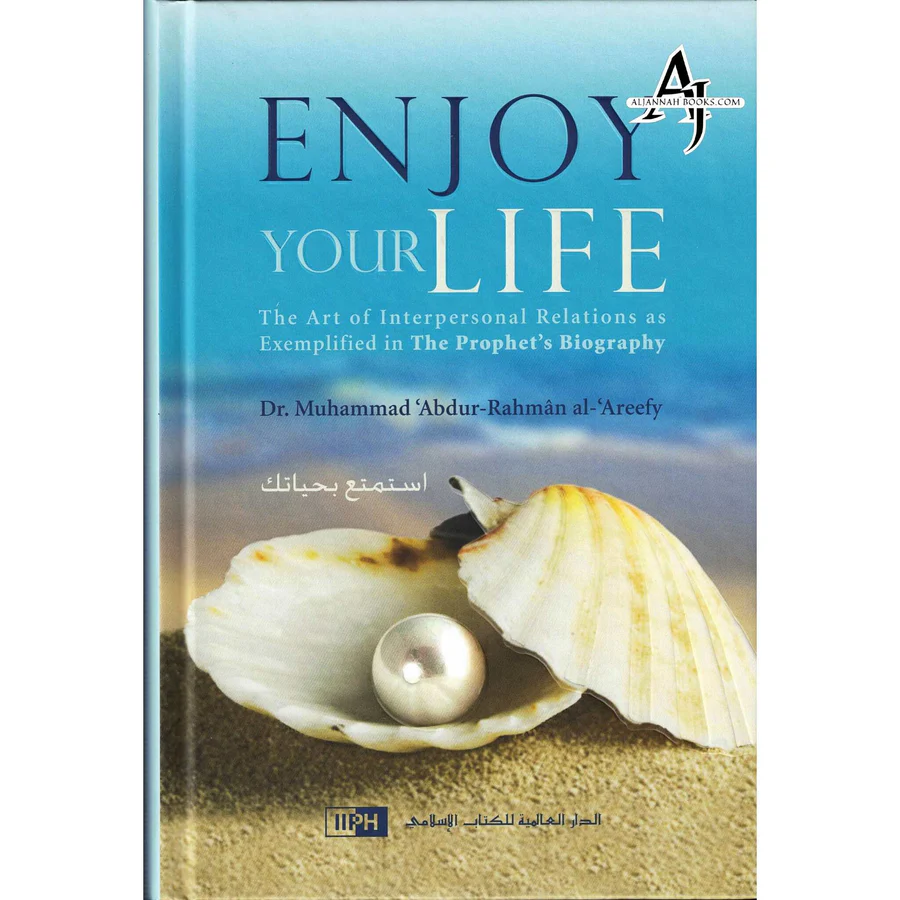In his book, Enjoy Your Life, Dr. Muhammad Abdur-Rahman al-Areefy unravels deep meanings for happiness in the light of the teachings of Islam. He presents true joy as something holistic, urging people to seek pleasure beyond vain desires. This blog explores the core concepts and practical suggestions to living a happy life while saving one’s capital-faith, gratitude, self-awareness-on how it is understood by Muslims.
Understanding the Concept of Happiness in Islam
Happiness, as understood by the context of Islamic teachings does not mean merely relishing in luxuries or in gains through wealth and prestige. On the contrary, real happiness pertains to contentment in Allah’s will, putting more importance on spiritual development, with a balance between activities in life. As interpreted by Dr al-Areefy, Islamic values put the framework within which to fulfill one’s life; automatically coming along with peace and satisfaction.
Going beyond the materialistic goals, the novel subjects the reader to introspection: “Wealth, good as it is in some ways, cannot be the sole source of happiness. Happiness in fact lies in compliance with what Allah has ordained and reliance on His will.” She said. This provided a foundation for true happiness, even at hardship.
The Role of Gratitude: A Way to Happiness
One of the big lessons learned while reading Enjoy Your Life is thankfulness. On one occasion, Dr. al-Areefy pointed out that practicing gratitude brings one joy and closeness to Allah. A grateful heart must find delight in anything as simple as a blessing. Gratitude helps someone not dwell on the lacking part but look into that which is already there in their life.
By frequent acknowledgment of Allah’s blessings, no matter how minute or limited they are, people start developing a positive mindset. This changed attitude enables them to look at and enjoy much more of life’s meager moments, and this may possibly alter their mental status. As one gets into the practice of thanking, they involuntarily find themselves near Allah and nourishing lives. Dr. al-Areefy suggests that the formation of daily gratitude building is the means through which one can build positive thankfulness.
Patience and Perseverance: The Essential Constituents of Long-Term Happiness
Another strong theme found in the book is patience (Sabr). Dr. al-Areefy infers that happiness and real life could only be achieved with this all-important quality of patience. Faced by continuous trials in life, wariness turns into either a positively crushing or utterly debasing force, depending upon how one deals with the same. With perseverance and patience, Muslims pass through hardship very strongly.
Since the Prophet Muhammad (peace be upon him) encouraged people oftentimes to hold on patiently amidst hardships, basing on the fact that hardships are trials and trusting Allah’s wisdom, then people would have a positive attitude amidst tough situations. The same view of life makes trials chances for growth on spiritual as well as personal grounds.
Prayer and Worship as the Road to Achieving Happiness
One of the most effective means through which a Muslim can achieve happiness is through prayer, or Salah. Dr. al-Areefy urges his readers to bond with Allah by conducting regular acts of worship. “Prayer is more than an act of obedience; it was, and is, a source of comfort and peace which allows humans to momentarily disregard their worldly issues and attentions towards their relationship with Allah.”.
Aside from the five daily prayers, Dr. al-Areefy would also suggest some other forms of worship such as the recitation of several verses from the Quran and the performance of some Nafl voluntary prayers. These bring spiritual fulfillment and peace that no material success can equal.
Importance of Having Good Relations
Islam teaches relationships with family, friends, and society. Dr. al-Areefy in Enjoy Your Life describes how all that contributes to happiness are relations. Prophet Muhammad (peace be upon him) said, “The best of you are those who are best to their families.” So, it is clear that kindness, respect, and love are important for a harmonious life.
Human bonding with loved ones must be developed to strengthen emotional well-being. “Relationships need to be based on mutual respect and understanding,” says Dr. al-Areefy. Relating and care for one another with the throb and flow of life develops a feeling of safety and happiness towards life. They learn to live a better life by forgetting a few negative emotions.
Letting Go of Negative Emotions: The Path to Inner Peace
Dr. al-Areefy also emphasizes the significance of emotional well-being. Some negative emotions such as anger, jealousy, and hatred can negate happiness and bring strife to the person’s inward self. One must learn to dispense with such feelings by instead filling them with love, compassion, and forgiveness in order to reach true peace.
The book encourages Muslim people to find peace with themselves by being a better version of their mental and emotional lives. It calls for introspection, expanding on the need to know and cope with emotions that would not cause undue stress.
One takeaway is that giving up grudges and dwelling on forgiveness brings peace to the heart and clarity to the mind.
The Power of Giving: Charity and Giving to Others
One great way to increase happiness is through acts of charity called Sadaqah. Helping others not only improves the recipient’s quality of life but also increases the giver’s motivation and sense of fulfillment: whether granting financial support, lending time, or simply as a source of emotional support, that sense of purpose that one gets from doing good for others is further enhanced.
This breeds empathy and binds the community together very well. Charity deed reward in Allah’s sight is very large. Dr. al-Areefy asks Muslims to put charity into daily actions not just monetary but using words and action towards good. This becomes a source of so much greater joy and satisfaction.
Philanthropic Attribute Building Through Self-Reflection and Personal Growth
Another recommendation from Dr. al-Areefy to the reader is to reflect on himself regularly. By doing this, individuals learn their own strengths and weaknesses and make improvements. The desire to grow never ends, and in the long run, it will bring people much more self-awareness and inner peace.
It is in such reflection where Muslims can find where they should change and be altered. It would also be a chance to deepen faith, consider the acts, and align oneself’s life according to the Islamic teachings. The more a person tries for personal improvements, the fuller and meaningful life would be.
Conclusion: A Fulfilled Life through Islamic Principles
Enjoy Your Life by Dr. Muhammad Abdur-Rahman al-Areefy, is a book of timeless wisdom for whoever might seek true happiness in this world. One can lead a balanced life that is grounded in the principles of Islam–happiness mixed with peace, gratitude, and patience accompanied with personal growth-through the teachings of this book.
In the opinion of Dr. al-Areefy, true happiness then, is not based on material riches and temporary gratifications. True happiness results from developing a firm bond with Allah, from a life spent in acts of worship, or from relationships where one finds love, good company, and peaceful comfort. With these practices, a Muslim shall enjoy life as being of value, joyful, and content.
Through these, with application, Muslims can change their lives toward the achievement of meaningful lasting happiness.
Read more: 30 Ways To Attain Happiness (3rd Edition)


